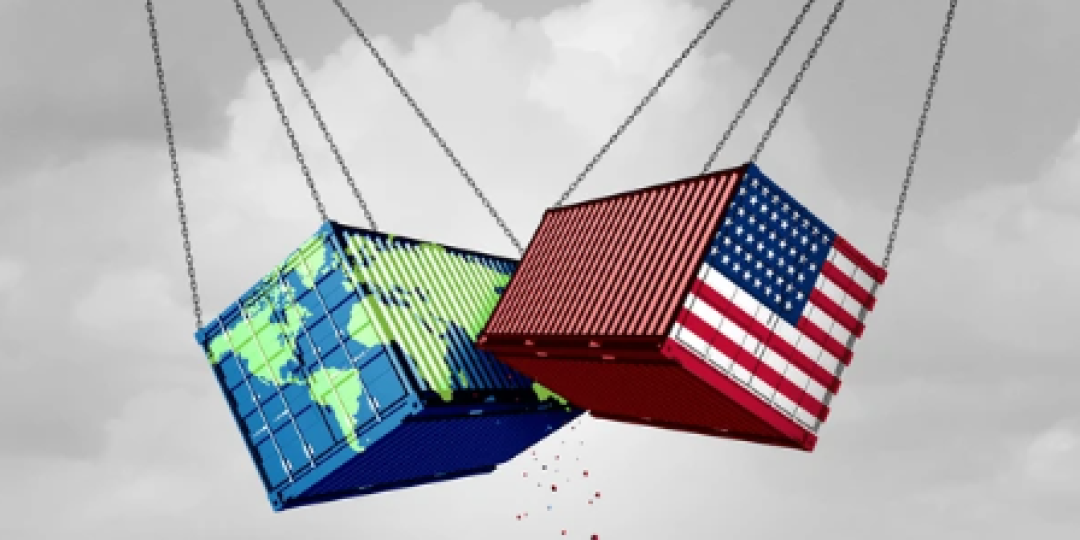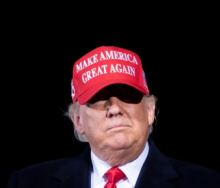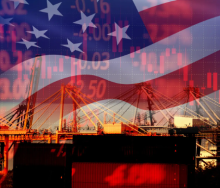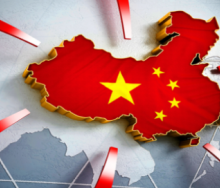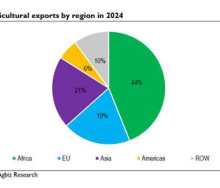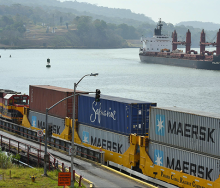The 10% baseline tariff implementation by President Donald Trump on most goods imported to the United States, as well as much higher levies on dozens of rivals and allies alike, has intensified a global trade war that threatens to stoke inflation and stall growth.
Reuters reports that the sweeping penalties announced against the serene backdrop of the White House Rose Garden on Wednesday immediately unleashed turbulence across world markets and drew condemnation from various heads of state.
The April 2 announcement is effectively ending an era of trade liberalisation that has shaped the global order for decades, the news agency writes.
As Asia digested the news on Thursday morning, stock markets in Beijing and Tokyo sank to multi-month lows, with US and European stock futures also pointing to sharp losses as investors scrambled to the safety of bonds and gold.
Now facing 54% tariffs on exports to the US, China vowed countermeasures, as did the European Union.
"The consequences will be dire for millions of people around the globe," EU chief, Ursula von der Leyen, said in a statement, adding the 27-member bloc was preparing to hit back if talks with Washington failed.
US Treasury Chief Scott Bessent earlier warned that any such retaliatory moves would only lead to escalation.
Among close US allies, the European Union was targeted with a 20% rate, Japan with 24%, South Korea with 25% and Taiwan with 32%. Even some tiny territories and uninhabited islands in the Arctic were hit by tariffs, Reuters reports.
This is according to a list posted by the White House on social media platform X, which is owned by Elon Musk, an adviser to Trump.
The base tariffs come into effect on April 5 and the higher reciprocal rates on April 9.
Trump said the “reciprocal tariffs” were a response to duties and other non-tariff barriers placed on US goods. He argued that the new levies would boost manufacturing jobs at home.
"For decades, our country has been looted, pillaged, raped and plundered by nations near and far," Trump said.
Outside economists have warned that tariffs could slow the global economy, raise the risk of recession, and increase living costs for the average American family by thousands of dollars.
Canada and Mexico, the two largest US trading partners, already face 25% tariffs on many goods and will not face additional levies from Wednesday's announcement.
From his own party’s rank, Republicans have expressed concern about Trump's aggressive trade policy.
Within hours of Wednesday's announcement, the Senate voted 51-48 to approve legislation that would terminate Trump's Canadian tariffs, with a handful of Republicans breaking with the president.
Reuters reports that passage in the Republican-controlled US House of Representatives, however, was seen as unlikely.
Stephen Miran, the chairman of Trump's Council of Economic Advisors, said tariffs would work out well for the US in the long run, even if they caused some initial disruption.
"Are there going to be short-term bumps as a result? Absolutely.”
The reciprocal tariffs do not apply to certain goods, including copper, pharmaceuticals, semiconductors, lumber, gold, energy and "certain minerals that are not available in the United States," according to a White House fact sheet.
Following his remarks, Trump also signed an order to close a trade loophole used to ship low-value packages – those valued at $800 or less – duty-free from China, known as "de minimis".
The order covers goods from China and Hong Kong and will take effect on May 2, according to the White House, which said the move was intended to curb the flow of fentanyl into the US.
Chinese chemical makers are the top suppliers of raw materials purchased by Mexico's cartels to produce the deadly drug, US anti-narcotics officials say.
A Reuters investigation last year showed how traffickers often routed these chemicals through the United States by exploiting the de minimis rule. China has repeatedly denied culpability.
Trump is also planning other tariffs targeting semiconductors, pharmaceuticals, and potentially critical minerals, the official said.
Earlier in the day, the administration said a separate set of tariffs on auto imports that Trump announced last week would take effect starting on Thursday.
Trump previously imposed 25% duties on steel and aluminium and extended them to nearly $150 billion worth of downstream products.
Tariff concerns have already slowed manufacturing activity across the globe, while also spurring sales of autos and other imported products as consumers rush to make purchases before prices rise.
Now, as the reality of the new tariffs sinks in, companies around the world must consider how to adjust, with limited and often unpalatable options for their customers.
"This is how you sabotage the world’s economic engine while claiming to supercharge it," said Nigel Green, CEO of global financial advisory, deVere Group.
"The reality is stark: these tariffs will push prices higher on thousands of everyday goods – from phones to food – and that will fuel inflation at a time when it is already uncomfortably persistent."
